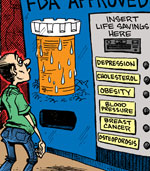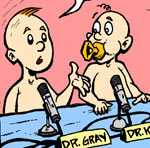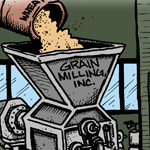The Hormone of Sleep, Melatonin and Insomnia in People of All Ages
| Share on Facebook | Share on Twitter | Share on Google+ |
Melatonin is widely known as the hormone of sleep. Made in the brain during sleep when the eyes are not exposed to blue light (and the retina can detect blue light even when the eyelids are closed), melatonin ensures that people fall asleep at night and wake up in the morning.
Melatonin is essential to the circadian rhythms that define wakefulness and rest. Whether taking melatonin actually helps you get good sleep, however, seems to depend on your age.
How Darkness Helps Your Body Make Melatonin
Melatonin is a hormone made by the pineal gland, which lies deep inside the brain. The purpose of melatonin is to shut down the nerve pathways in the brain that keep us awake. The production of melatonin in the brain is greatest when it is dark outside, and it is also dark in the sleeping room.
Even a tiny amount of light in the blue spectrum can stop the production of melatonin. Having a light on in a hallway and just a little light coming in through a crack between the door and the door jam is enough to stop the production of melatonin and to keep you awake.
Supplemental melatonin can induce sleep even when the brain does not make enough of the hormone on its own. Taking melatonin can also adjust the body's internal clock for travel or work at night. As we age, however, the brain makes less and less of this hormone we all need for sleep.
Melatonin Production Declines with Age
The older we get, the less our bodies are plugged in to daily cycles of sleep and wakefulness. It is not uncommon for people over the age of 50 to get less sleep at night. This is often interpreted as not needing enough sleep, but this interpretation overlooks the fact that people over 50 often feel less and less energetic during the day. Losing energy to enjoy life should not be considered "normal!"
One of the reasons older brains make less melatonin is calcification of the pineal gland. Another of the reasons older brains make less melatonin is that the biological clock in the brain's suprachiasmatic nuclei (SCN) just stops "ticking."
Whether it is one factor or both that causes insomnia, there is little down that a big dose of fast-acting melatonin helps elderly people sleep. The problem is that it helps them sleep right away whether they need or want to go to sleep right away or not. And the effects of melatonin supplementation in people under 50 are not as reliable.
Extended-Release Melatonin to the Rescue
In the European Union, people are now able to buy government-approved extended-release melatonin. Provided in a 2-mg tablet rather than the more common 1-mg tablet, extended-release melatonin dissolves in the small intestine to provide a steady stream of melatonin for a full eight hours. The advantage of taking one 2-mg tablet over taking two 1-mg tablets is that taking a double dose of melatonin "knocks you out," but may not keep you asleep all night.
Recent research has found that people over about age 55 benefit from more melatonin no matter how much melatonin their brains already make. The pineal gland may sputter to make enough of the hormone to keep mature insomnia cs asleep all night, and just not work well enough for restful sleep. More melatonin in an extended-release form is just what the doctor ordered (or not, if you live in countries like the US and Canada where melatonin is available over the counter with a prescription).
Melatonin for Younger Adults
But what if you are just 18 years old and you have chronic insomnia? For you, the problem usually isn't that your brain isn't making enough melatonin. The problem usually is that you have stayed up all night, or taken a long trip, or you are having to work a night shift.
For you, the older, faster acting melatonin makes up for the fact you did not have an opportunity to sleep during nighttime hours. When you get back to a sleeping schedule that has you awake during the day and sleeping at night, you won't need to take melatonin any more.
Younger adults need faster acting melatonin (the kind that's readily available) and they need to take it just before going to bed. Older adults need slow-release melatonin, and they also need to take it just before bedtime, but they also need to be able to sleep for 8 or more hours without interruption for the melatonin to do its job.
If you are over 55, taking melatonin just before bedtime on a regular basis may help you sleep on a regular basis. If you are a woman, some studies indicate taking melatonin will lower your risk of ovarian cancer. Studies also show that for both men and women, taking melatonin may lower the risk of Alzheimer's disease.
Selected References:
Buscemi N, Vandermeer B, Hooton N, Pandya R, Tjosvold L, Hartling L, Baker G, Klassen TP, Vohra S. The efficacy and safety of exogenous melatonin for primary sleep disorders. A meta-analysis. J Gen Intern Med. 2005;20(12):1151-1158. doi: 10.1111/j.1525-1497.2005.0243.x.
Mahlberg R, Kienast T, Hadel S, Heidenreich JO, Schmitz S, Kunz D. Degree of pineal calcification (DOC) is associated with polysomnographic sleep measures in primary insomnia patients. Sleep Med. 2009;10(4):439-445.doi: 10.1016/j.sleep.2008.05.003
-
Skin CareMen Skin Care
-
Free ResourcesFree eBooks
-
By creating an artificial environment, we're not stimulating our immune system enough. Germs are immune-stimulants. They challenge you to be prepared.Deepak Chopra
-
Featured Health Supplement
 If you find a product that is as effective as Total Balance, and is better value for money, let us know and we will give you a refund equivalent to your entire purchases of Total Balance…retrospective.
If you find a product that is as effective as Total Balance, and is better value for money, let us know and we will give you a refund equivalent to your entire purchases of Total Balance…retrospective.
-



















